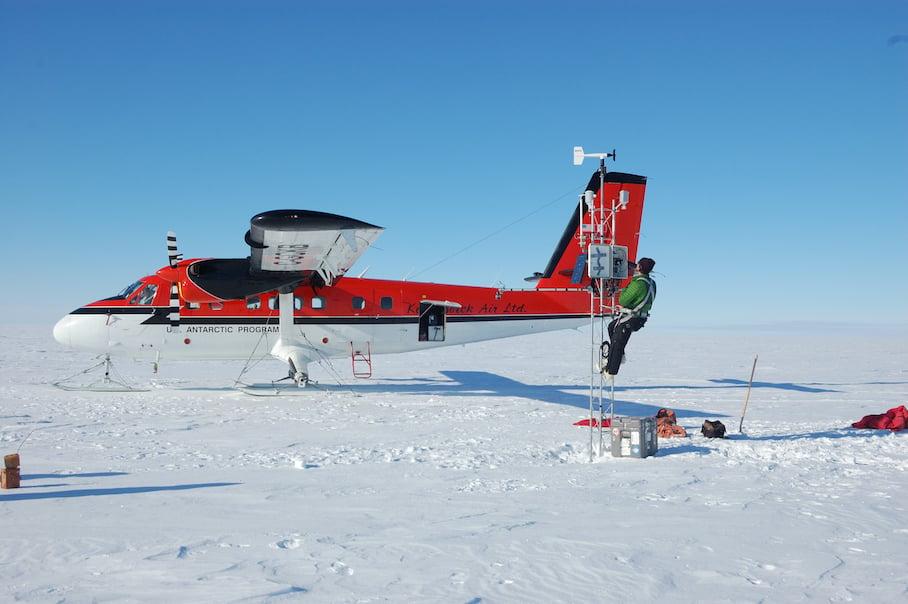University of Wisconsin researchers reveal that Wisconsinites are not the only ones experiencing unseasonably warm temperatures in recent years. According to the Extraordinary March 2022 East Antarctica “Heat” Wave study, data collected from automatic weather stations across East Antarctica exhibit all-time temperature highs on the frozen land.
Researcher at the Antarctic Meteorological Research and Data Center David Mikolajczyk said the first few AWS were deployed in 1980. Since then, around 60 different stations across the continent have been added. A team of students and faculty at UW and Madison College are utilizing these stations to monitor temperatures and further research the varying drivers and impacts of such extreme weather events.
“We base our operations out of McMurdo Station which is on Ross Island, so the majority of our work is around there, but have expanded to go across the whole continent [of Antarctica],” Mikolajczyk said.
According to the “‘Heat’ Wave” study, the Antarctic land experienced record-breaking temperatures between 30-40 degrees Fahrenheit above normal in March of 2022. Temperatures, though, typically begin to fall at this time of year, Mikolajczyk said.
A weather station in East Antarctica measured a record high of 15.1 degrees Fahrenheit March 18, 2022, Mikolajczyk said. This observed temperature — 79.2 degrees Fahrenheit above average — was a catalyst for a collaborative effort on the meteorological causes and impacts of the extreme climate event.
Tomatoes take flight: TASTIE explores plant development in space
Through observations derived with weather station technologies, the team measured the impacts of an atmospheric river, such as warm temperatures, that had a role in subsequent weather changes, Mikolajczyk said.
Atmospheric rivers are weather events researchers can observe with numerical weather models, principal investigator at the Antarctic Meteorological Research and Data Center Matthew Lazzara said. The AWS then relay their data back via satellite.
“Since we get the data back in real-time, we could see the temperatures climbing and it was just traumatic,” Lazzara said.
Leading up to the climate event, tropical storms from the central and southwest Indian Ocean attributed to the atmospheric river, according to the study, which the researchers visualized with their weather stations. Many tropical storms occur around the equator, sending moisture and energy high into the troposphere that can affect weather patterns elsewhere, Mikolajczyk said.
Aside from the real-time data collection, the research group also used numerical weather models to analyze past and present weather conditions, Mikolajczyk said. These models are critical for understanding how weather conditions appeared prior to the current day.
“We plan to continue this for as long as we can,” Mikolajczyk said. “This is a very valuable tool and service for the community to have weather data across the data sparse regions such as Antarctica.”
Study reveals positive relationship between art representation, science understanding
While the project remains based in Madison, both UW and Madison College will continue to monitor the changing temperatures across the continent, Mikolajczyk said. This process has and will continue to allow for significant community involvement across both campuses.
On both campuses, undergraduate students and faculty play a role in this research and make a difference in this project, Lazzara and Mikolajczyk said.
“Undergraduate students are helping with everything from data management and stewardship to moving up to writing some of the papers we are working on,” Mikolajczyk said.
While involvement in this project has significantly impacted the awareness of climate change across the Madison community, it is also a tell-tale for future climate events in Antarctica to similar extremes, Lazzara said.
Such weather events are projected to occur again. Lazzara said understanding the weather patterns in extreme climates, such as Antarctica, continues to be critical for the safety of researchers who will continue traveling to the continent. Going there is dangerous and researchers need to understand it for their safety when going to service the weather stations.
UW biochemists’ vision extends past US, impacts communities in Uganda
“If we aren’t there to capture the weather behavior and learn about it, then we’re in trouble,” Lazzara said. “[We] use that network of observations to learn about the behavior and how Antarctic weather works.”
Despite the blistering temperatures, these trips bring hands-on experience to UW community members monitoring weather changes and allow them to share those experiences with the community and beyond, Lazzara said.
Strong atmospheric rivers are highly prevalent in temperature changes the U.S. is seeing as well, such as how they’ve recently affected the California coastline, Mikolajczyk said.
Though Antarctica may seem like a world away from Madison, this study speaks volumes about the future of the changing climate everywhere, including Wisconsin, Mikolajczyk said.
“Everything is connected,” Mikolajczyk said. “As this research has shown, things that happen in the tropics can affect things that happen in Antarctica — Antarctica seems like a far-off place, but it is not that crazy different from things that can happen here.”
Editor’s Note: This article was updated to correct information about the automatic weather stations.















